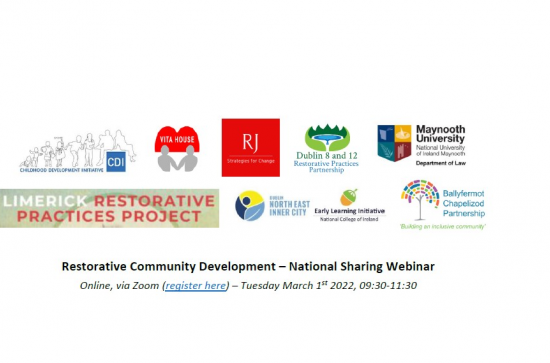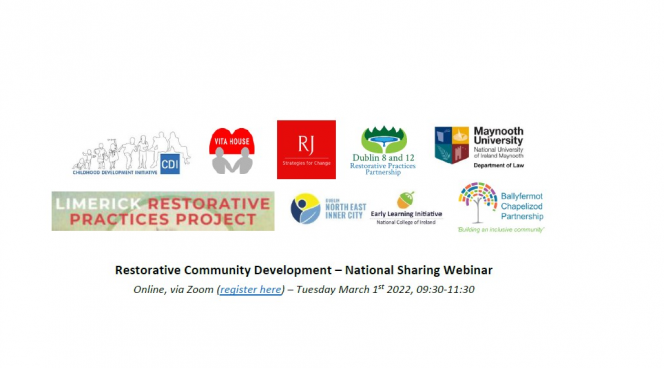
From 9:30-11:30 on March 1st 2022, over 130 people joined a national webinar on restorative community development. The webinar aimed to create a platform for local restorative practice networks to share elements of their work with others engaged, or hoping to engage, in restorative partnership working across Ireland and elsewhere. It doubled as an opportunity to meet other people with an interest in restorative practices and sought to energise those who already use restorative practices in different (and across) settings and sectors.
The webinar was organised in partnership between Maynooth University School of Law and Criminology, Restorative Justice: Strategies for Change, Limerick Restorative Practices Partnership, D8/12 Restorative Practices Partnership, Building Community Resilience, D10 Restorative Practices Project, Ballyfermot Chapelizod Partnership, Childhood Development Initiative, Early Learning Initiative (National College of Ireland) and Roscommon Restorative Practices Network (Vita House). It featured speakers from each of these groups, and from Restorative Practices Ireland.
Dr. Ian Marder (Maynooth University School of Law and Criminology, Restorative Justice: Strategies for Change) welcomed attendees and defined key terms to frame the morning’s discussions. Noting recent engagement with community work professionals who clarified the meaning of community development in that sector, Ian explained that the group were interested in local restorative practice partnerships. These enable the statutory and community sectors collaboratively to develop a restorative approach to citizen-facing, internal and inter-agency/sector work. Such partnerships seek to create a local ecosystem and network that helps mainstream restorative practices in these three spheres – operationally, internally and collaboratively, across organisational boundaries. If, across all three spheres and by default, professionals and organisations orient their actions towards building positive relationships, enabling stakeholder participation and addressing and repairing harm when it occurs, a restorative culture will develop.
Next, Joe Power (Limerick Restorative Practices Partnership) spoke about his use of virtual circles on different platforms and using different technologies to support local practitioners, and to build and maintain relationships during and following COVID-19. He described establishing a WhatsApp Circle that allowed people to connect regularly. Participants checked-in with and learned about each other by asking questions and sharing views. He also discussed his of Teleconference Circles, Online Story Exchanges, and Restorative Films with Dialogue Circles, the last of which were attended by persons from all over the world. Joe urged participants to continue using technologies that were normalised during the pandemic, where these were still of value. He previously wrote about this work here.
Peter Dorman (D8/12 Restorative Practices Partnership, Building Community Resilience) spoke about the partnership’s work to develop a cluster of restorative services for young people. The area in which the group are based has high levels of anti-social behaviour and drug use among young people, and many professionals locally had sought to use restorative practices in response. They began by offering introductory training locally to anyone who would take it. This was successful in some ways, but they found that it was difficult for trainees to embed the practice. They moved strategically towards building a cluster of restorative organisations in Inchicore South where many people from youth projects, schools and other bodies had expressed an interest in RP. The idea was that children in that area should experience restorative practices as they moved through crèches, schools, youth projects and beyond.
Ciara Flanagan (D10 Restorative Practices Project, Ballyfermot Chapelizod Partnership) spoke about training the public in restorative practices. While many professionals were trained locally, the public in Cherry Orchard still had little knowledge of RP. They decided to develop an accessible RP training that could be delivered online due to COVID. This moved through several phases of development, as courses with different intended audiences, lengths and modes of delivery were piloted, reviewed and revised based on feedback and consultation. The final course was called ‘positive ways to deal with disagreements’ – a one-hour webinar framed around low level conflict, which they delivered four times. They also offered free conflict coaching for course participants. Key learnings included the importance of consultation with the intended participants of training to see what problems the training should address and ensure that it is framed in ways to which people can relate.
Dr. Kieran O’Dwyer spoke about the Restorative Practices Ireland Quality Assurance Framework, which he drafted and which was published in December 2021. The framework was designed to be of value to all sectors. Kieran noted that RPI is a membership and voluntary organisation with a vision of Ireland as a restorative society that integrates RP as standard in developing and sustaining strong and happy communities. One of its objectives is to promote quality assurance, and this is the second edition of its quality assurance framework. The current framework has four key elements: values, objectives and principles of RP; standards; guidance; and quality assurance mechanisms. Kieran noted that practitioners must be fully aware of and understand standards, receive support from their organisations to meet standards, and be personally committed to maintaining high quality practice through a range of mechanisms.
Emma Wheatley (Early Learning Initiative, National College of Ireland) spoke about the collection of data to support restorative practices in the Dublin Docklands and North East Inner City Dublin. ELI’s restorative practices project has sought to create restorative communities since its inception seven years’ prior. The scale and complexity of what they are trying to do, and the number of statutory and community partners they work with, required the development of an action research methodology to support and evaluate the project. Restorative practices and community action research are highly compatible. The data they collected over time included evaluations and reviews of various activities, needs assessments, focus groups and pre-and post-training surveys. They also used some innovative methods (such as observing games and arts) to collect data from children and young people locally.
Claire Casey (Childhood Development Initiative, CDI), spoke about the development of restorative practices training. CDI established an RP programme as part of its community safety initiative in 2010. CDI began developing its own training in 2013, seeking to ensure that this was in line with the needs of people in their community. Their training is subject to ongoing evaluation, and the materials used are updated regularly. The training has been delivered around the country to over 4000 people, and is tweaked in line with feedback surveys that collect quantitative and qualitative data. They are also the only body to provide a ‘train the trainer’ RP course in the Republic of Ireland. The training was evaluated in 2021, on the basis of which there will shortly be a major revision of CDI’s training to incorporate new follow up support and to give more practice to trainees.
Finally, Faye Hayden (Roscommon Restorative Practices Network, Vita House) spoke about writing a local restorative practices strategy. Her group aims to take a holistic approach to RP in community development, albeit they are at an earlier stage in doing so than the other speakers were. Faye spoke to the mission statement and values of the partnership and the composition of the network. Participants come from a diverse range of statutory and voluntary services and networks, including youth work, community development, health, social inclusion and environmental organisations. Faye also spoke about the integration of RP into a local young carers’ project, working with young carers to strengthen their interactions with parents and families. The goal of the work is to restore young carers’ opportunities and improve outcomes for that cohort. The project will include RP training for the young people, for their parents and for the professionals that interact with them.
To join the Restorative Justice: Strategies for Change mailing list or receive copies of slides from any of the above speakers, please contact Ian on ian.marder@mu.ie.

